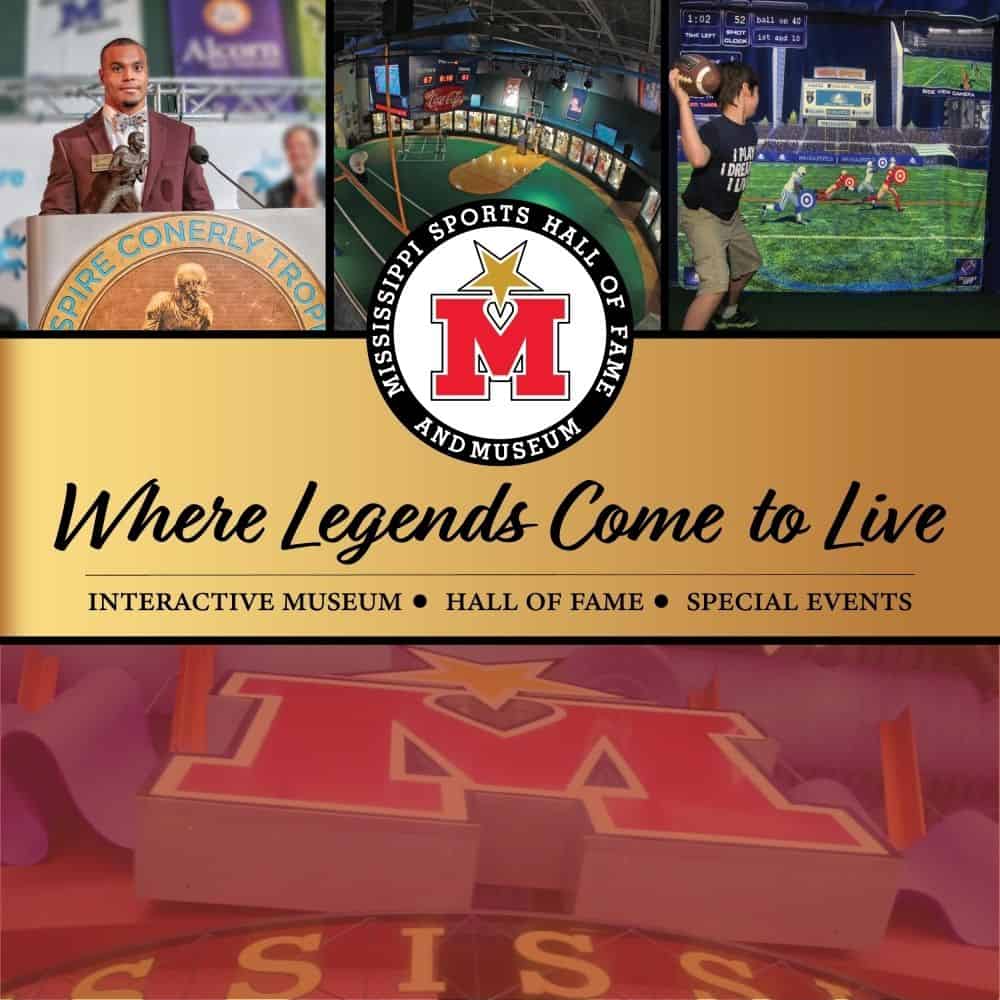By Billy Watkins
Before Twitter, Facebook and message boards, Chuck Stinson helped give sports fans in Mississippi an outlet.
Got a gripe about your team? Have a question? Want to know if you’re the only person who thinks a certain coach stinks?
Mississippi Sports This Morning with Chuck and Doug Colson — broadcast on WJDX-AM radio in Jackson — was your place to be 6 a.m. to 9 a.m. every weekday from 1998 to 2014.
People across the state already knew Chuck as the sports director at WLBT, Channel 3, in Jackson. They had seen his professionalism and passion for sports, his down-home personality, his “I am one of you” approach to his job.
“We had no idea the show would become so popular when we started out,” said Colson, who worked at WLBT with Chuck. “We were lucky to have that friendship before going on the radio. And we were lucky to hit that particular time when talk radio was really starting to take off.”

And neither had an in-state agenda. Chuck grew up in Oak Ridge, Tenn. Doug grew up in
Enfield, Conn. Both had adopted the Seattle Seahawks as their favorite team for different reasons before they ever met.
“Our approach was sort of like we were the two slackers at the office who stood around the water cooler, talking too much. And others would stop by and chat for a bit. That’s really the way it was.”
In 2009, Chuck found an additional passion. It had nothing to do with games and rivalries. It dealt with life and death. And it was far from the daily spotlight.
Kevin Stump, CEO of MORA (Mississippi Organ Recovery Agency), had met Chuck at different events. He was impressed with how easily Chuck interacted with people, admired his energy and approachable personality.
At lunch one day, Stump explained to Chuck in detail MORA’s mission to help find organs and tissue for those who desperately need them.
“I floated the idea of him coming to work for us,” Stump said. “I told him, ‘I want people who have your desire and passion and your media and marketing skills.’ He asked for some time to think about it. And we worked out a deal where he could still do the radio show in the morning, and then come to MORA.”
It was Chuck’s job as Director of Community Services and Relations to help make the public aware of the importance of signing up to be a donor, the difference they could make.
Chuck was moved by the idea that he could actually help save lives. And he did that. Time and time again.
************

Chuck died Jan. 2 of HLH, a rare blood disease that attacks the body’s immune system and organs. He was 60, married (Regina), and the father of three grown daughters — Claire, Emily and Molly.
He battled that disease for 27 months, fought until he couldn’t fight anymore.
And it bothered him greatly that at the end of his journey, because of the disease and receiving a stem cell transplant, he couldn’t do what he had asked so many to do — donate.
Carrie Deese, who worked with Chuck at MORA, recalled him saying near the end, “You mean there isn’t anything that I can give somebody?”
Chuck’s illness started out with severe headaches and flu-like symptoms. He eventually entered University of Mississippi Medical Center, where he was diagnosed with HLH, and then traveled to M.D. Anderson Hospital in Houston.
Several times, doctors thought the fight was over. Chuck would rally.
“I really thought that somehow he was going to pull through this,” Colson said.
But on Thanksgiving Day, the doctors said there was nothing else they could do. They told his Regina to call family and friends who might want to see him one last time.
Deese, who became close friends with Chuck at MORA, was one of several to make the trip.
“You know, you worry about what you’re walking into,” Deese said. “He was weak. He was on oxygen. But he was Chuck. He asked about everybody at work, how it was going.
“I was with him for seven hours. And when some of the nurses got off their shift, they came and hung out in Chuck’s room. It was amazing to see. But I guess maybe they had never seen anyone like Chuck and Regina.

“She was Chuck’s rock through it all. She moved mountains for that man — ‘my man’ she called him.’
Said Colson: “Regina had a fold out bed in his room, and she lived with him the entire time, went through everything with him. I can’t imagine what that’s like — trying to take care of your husband while also trying to keep your own sanity.”
Chuck knew the sacrifice she chose to make.
“He would say, ‘Pray for me. But pray for Regina, too,’ ” Deese said.
The last hurdle Regina helped Chuck clear was getting him home to Madison. He did not want to take his final breath in the hospital. As Regina wrote in a post, “He wants to be home surrounded by family, friends, and his dogs.”
With donations of those friends and fans, some of whom he probably never met, Chuck flew home Dec. 9.
“When we were doing the radio show and working at the TV station, we spent more time together than with our own families,” Colson said. “People associated us with one another. I remember Chuck saying that whenever he was out somewhere, people would ask, ‘Doug isn’t with you?’ He said, “Do they think we are Siamese twins or something?’
“But we got to know each other really well. Whenever we would be somewhere and Chuck ran into someone from the Delta, that person would almost fall out,” Colson said. “They were like ‘I remember watching you on WABG (the Greenville television station). It was like they saw Elvis.’ It happened all the time. So I started calling him the Delta Legend.
“When I went to see Chuck after he got home, I was telling a friend that story. Chuck was really weak. Not talking much. But after I told that story, he muttered something. Then he muttered it louder. ‘You’re full of crap.’
“That was the last thing Chuck ever said to me, and I am more than fine with that.”
*********

To tell Chuck’s story, we cannot ignore his genuine love for pulling pranks.
One of his best was on April Fool’s Day during the radio show.
“He’d told me he was going to do it, but I really didn’t believe him,” Colson said.
For the first hour of the show, Chuck completely changed the format. Instead of talking sports, the show was now ‘Love 62’ featuring songs of romance.
“He told them the station had fired me, and that he hoped they liked the new format,” Colson said, laughing. “People were calling in asking ‘Who do we need to call to get it changed back?’ It was genius.”
Once they became friends, Deese was a frequent target.
“This one happened when he was in the hospital and still able to take part in our meetings via computer,” Deese said. “And we have some pretty emotional and touching stories that we talk about. I had just given a very emotional talk about our goals, our purpose and really focusing on that.”
Everyone was quiet after Deese’s talk — except Chuck. “Well, ‘Deeser’ this was taken just yesterday. Is this the purpose you’re wanting to convey?”
And on the screen, Chuck flashed a photo a workmate had taken in the airport. It showed Deese stretched out in a waiting area, her feet propped on her suitcase, wrapped up in a scarf and not exactly looking her best.
Everyone burst out laughing.

Another: Deese has children and grandchildren who are deaf. On a shelf in her office, she used to keep a wooden hand that bent at the knuckles, and she would make different sign language messages. Most of the time, she displayed the love sign — the thumb, forefinger and pinky up.
Deese was sitting at her desk one day and looked up to see the hand with only one finger raised — the middle one.
“I knew Chuck had stopped by,” she laughed.
“But all his crazy stunts helped break the tension. We see a lot and it’s good sometime when you can just laugh. Chuck made us laugh.”
*******
One last thing about Chuck, and this is personal.
I got to know him because our jobs allowed us to cross paths. I was a sports writer and features writer at The Clarion Ledger when he was at WLBT.
We were both at Super Bowl 42 in Glendale, Arizona — when Eli Manning’s New York Giants upset the New England Patriots.
Chuck and I got a chance to talk a lot that week. We even wound up sitting together on the flight home. I kept thinking, “This is a solid dude.”
In 2015, I wrote a story about a 28-year-old gas station attendant, Kristopher Haywood of Macon, who was shot and left for dead. He eventually died at UMMC. One floor below him, a 52-year-old woman from Byram was dying of heart failure.
After talking with MORA, Kristopher’s parents decided to donate his organs. The woman received his heart. It saved her life.
A few months later, Chuck called and asked if I would like to come out and write a story about Kristopher’s family and the recipient meeting. I immediately said yes.
It was one of the most moving things I’ve ever witnessed. And I wanted to know how it made Chuck feel to see it.
“He said, ‘I’m not really the one who should be quoted,’ ” he said and pointed through a window, into the lobby.
“See that young lady (Jameeka Williams Jones) standing out there? She’s the one who talked to the family about donating,” Chuck said. “She deserves all the credit. Not me.”
Which told me everything about Chuck Stinson.
#########










